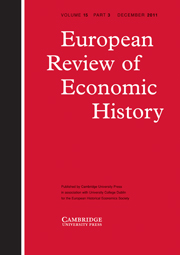Article contents
Trade wars and the Slump
Published online by Cambridge University Press: 26 March 2007
Abstract
Simulated optimum tariff policies to achieve plausible government targets show objective reasons for the failure of international trade cooperation during the Slump of 1929 to 1933. For the largest players, the US and UK, benefits from foreign cooperation were small or negative. France and Germany would have been the principal beneficiaries of international cooperative policies. Since cooperation on one issue, tariffs, was difficult, cooperation on many – through the cross-issue bargaining attempted at the 1933 London Conference- was well nigh impossible. Optimum coordination across policy instruments within one country, on the other hand, would have yielded high returns for policy. A corollary is that lack of internal coordination (poor domestic policies) was a more important cause of the Great Depression than failure to harmonise policies internationally.
- Type
- Research Article
- Information
- Copyright
- Cambridge University Press 2007
- 3
- Cited by


